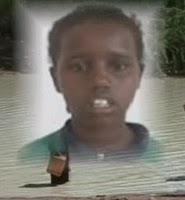Al-Shabaab
The Al-Shabaab militia prohibited journalists from taking pictures of the stoning, but allowed them to document the event. [1] Militants initially reported that the stoning victim was a woman who had confessed to adultery. Witnesses and local journalists estimated her age at 23 based on her appearance. [2] [14] A few days later, Amnesty International reported that Duhulow's father had told them that she was only 13, under the age of marriage eligibility, and that she was arrested and executed after trying to report that she had been raped. [1] [14] Her aunt, who had taken her to the police to report the alleged assault, reiterated the father's statement regarding her age. A human rights activist in the area subsequently informed BBC News that he had received death threats from Al-Shabaab for allegedly disseminating false information on the incident. However, he denied any involvement with the Amnesty International press release. [1]
Local reactions
Mohamed Abdullahi, director of the Somali Community Initiative in the United Kingdom, said that many Somali immigrants in the UK had been sympathetic to Al-Shabaab in the previous years and had sent funds to it. He further said, "Over here in Britain, they are not seeing the violence that they are fuelling, or realising that al-Shabaab has some very hardline policies. Many people here were shocked to hear about the stoning incident, and said that it was not Islamic. In that case, they should think twice about sending money." [7]
The African newspaper Maghrebia reported that the incident drew outrage in the Maghreb region of Northwest Africa. Bassima Hakkaoui, a Moroccan Islamist Justice and Development Party MP, commented, "In principle, the state has laws which specify which party is supposed to give judgement, along with the nature of the crime. It defies logic to hand down a death sentence to a woman who has been raped." Islamic educationalist Hamid Baalla agreed, saying, "You cannot describe people who resort to such actions as Muslim. These people are radicals and extremists." [21] It was described as "inhumane, barbarous" by Moroccan Organization for Human Rights President Amina Bouayache and as "an act of terrorism towards the Somali people, particularly women" by women's rights activist Hind Mbarki. [21]
The stoning was equally condemned in Tunisia and Algeria, where head of the Mounia Association for the Protection of Single Women Zakia Gawaou described the situation as unacceptable. [21] Muslim scholar Houssine Mohamed stated, "Adultery, in Aisha's case, was not voluntary. She was a victim of rape, as is the case of many young girls and women in Algeria who are raped by extremists. Therefore, sentencing her to death cannot be related to Islam." [21] Khadija Cherif, President of the Tunisian Association of Democratic Women, said, "We condemn violence against women for whatever reason or purpose, especially violence that denies human beings of their right to live." [21] Sofiene Ben Hmida, a member of the Tunisian League for the Defence of Human Rights, remarked, "This is an act committed by people who are living outside history. The danger doesn't lie with those people, but with those who just watch what they do without confronting them strongly and firmly." [21] Iqbal Gharbi, professor of Sharia and Religious Principles at Zeitouna University, called the incident an "act of barbarism worthy of denunciation". [21]
